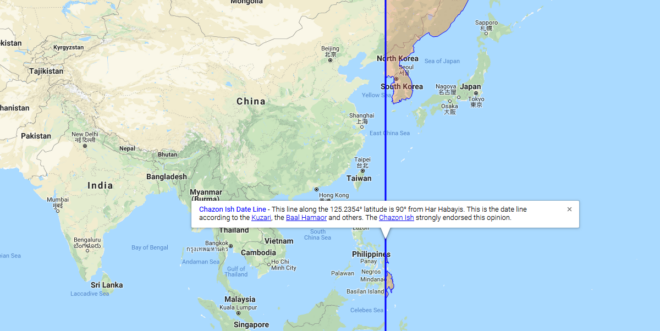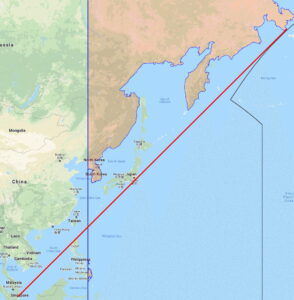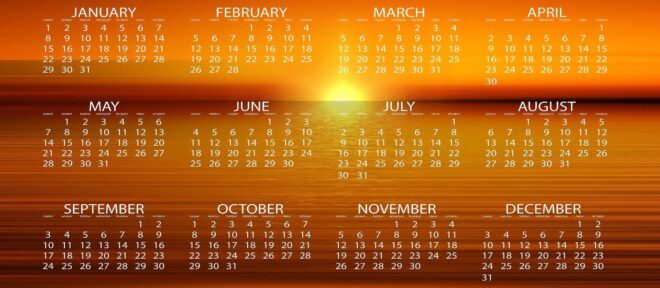
A primer on the Halachic Dateline
A primer for this halachic dateline post if you are not familiar with the subject, is the earlier Halachic Date Line Map post about the Jewish קו התאריך date-line. Based on the opinion of the בעל המאור Ba’al Hamaor, the חזון איש Chazon Ish ruled that the dateline is 90° east of Yerushalayim, and it can’t split a landmass. The concept of גרירה / graira is used to drag the land past the dateline to the water’s edge. This concept of graira is based on the יסוד עולם Yesod Olam, a תלמיד/disciple of the רא״ש Rosh. For this reason, according to the Chazon Ish, Korea and Australia follow the local date and not the previous date.
Islands Connected to Mainland by a Bridge
A question touched on in the previous article that was mostly theoretical, was about an island connected by a bridge to the mainland. Would the concept of graira apply to the island? The kollel members in Melbourne and others do not visit Phillip Island on Sundays for this reason, but Chabad chassidim who do not follow the Chazon Ish’s opinion, do visit Phillip Island on Sundays.
Islands in Bays
There are differing opinions whether an island in a bay would also be included in graira. Rabbi Yitzchok Meir Goldstein in his השבת בכל מושבותיכם (pages 85-88) brings the following opinions. Rabbi Shlomo Zalman Auerbach in הליכות שלמה (Moadim, vol. 2, page 70) is of the opinion that an island in a bay would be considered part of the land that partially surrounds it. In the same vein, (but not specifically in reference to a bay), Rabbi Moishe Sternbuch in מועדים וזמנים vol 7, ch. 236 mentions something similar (that the easternmost border of Australia would be a vertical line from north to south at the longitude of Brisbane, the eastern-most point of Australia). What is not clear is how large a bay can be. Rabbi Goldstein mentions that drawing a line from Siberia to Malaysia (thus creating a “bay”), would put Japan on the same side of the dateline as the Asian mainland. The Chazon Ish clearly stated that Japan was past the dateline. Presumably, Rabbi Shlomo Zalman Auerbach and Rabbi Moshe Sternbuch would agree that such a large area would not be included in graira. Given the lack of detail about the size of bays, it is possible that these poskim would only include very small bays (within the techum perhaps). It should be noted that Japan is only in the “bay” if you use a rhumb-line. Drawing a great circle line would result in Japan being out of the “bay”.
Rabbi Goldstein mentions that drawing a line from Siberia to Malaysia (thus creating a “bay”), would put Japan on the same side of the dateline as the Asian mainland. The Chazon Ish clearly stated that Japan was past the dateline. Presumably, Rabbi Shlomo Zalman Auerbach and Rabbi Moshe Sternbuch would agree that such a large area would not be included in graira. Given the lack of detail about the size of bays, it is possible that these poskim would only include very small bays (within the techum perhaps). It should be noted that Japan is only in the “bay” if you use a rhumb-line. Drawing a great circle line would result in Japan being out of the “bay”.  Rabbi Dov Landau in the פשר חזון, and Rabbi Moshe Heinemann do not include bays as part of the graira zone. Rabbi Sternbuch was asked about bays by Rabbi Goldstein, and he agreed that according to the Chazon Ish, bays would not be included in graira, so Rabbi Sternbuch either reversed his earlier opinion, or he disagrees with the Chazon Ish’s opinion.
Rabbi Dov Landau in the פשר חזון, and Rabbi Moshe Heinemann do not include bays as part of the graira zone. Rabbi Sternbuch was asked about bays by Rabbi Goldstein, and he agreed that according to the Chazon Ish, bays would not be included in graira, so Rabbi Sternbuch either reversed his earlier opinion, or he disagrees with the Chazon Ish’s opinion.
There are related opinions that bays themselves do not drag islands within them into graira unless land to their east is part of graira. See Rabbi Leib Blum’s קו התאריך בכדור הארץ for details. For example the Sea of Okhotsk is to the west of the Kamchatka Peninsula.  This means that they are of the opinion that you can’t have land to the east that is part of graira such as the Kamchatka Peninsula, and have Sea of Okhotsk and Sakhalin Island to the west of it that is considered past the line, (and back again to Siberia that is part of graira). The same would be the case in the portion of the Yellow Sea to the west of the Korean Peninsula and east of the Chazon Ish line, as well as the above mentioned Phillip Island and French island that are in the Western Port Bay near Melbourne. Bays such as Moreton Bay that includes Bribie and other islands near Brisbane, as well as Ulleungdo Island in the Sea of Japan would not be included in graira, since there is no graira land to the east of it.
This means that they are of the opinion that you can’t have land to the east that is part of graira such as the Kamchatka Peninsula, and have Sea of Okhotsk and Sakhalin Island to the west of it that is considered past the line, (and back again to Siberia that is part of graira). The same would be the case in the portion of the Yellow Sea to the west of the Korean Peninsula and east of the Chazon Ish line, as well as the above mentioned Phillip Island and French island that are in the Western Port Bay near Melbourne. Bays such as Moreton Bay that includes Bribie and other islands near Brisbane, as well as Ulleungdo Island in the Sea of Japan would not be included in graira, since there is no graira land to the east of it.
Incheon International Airport and the Halachic Dateline
In January 2019, the Star-K held a Kashrus training seminar in Shanghai for mashgichim who live or work in Asia. Among the sessions, was a shiur about the halachic dateline by Rabbi Dovid Heber who shared the URL to my halachic dateline map with the participants. One of the mashgichim, Rabbi Yosef Wexler, who travels from Eretz Yisrael to Asia regularly, noticed a potential issue related to the Incheon airport, the main airport in South Korea (near Seoul). The airport is located on Yeongjong Island, that is connected to mainland South Korea by two long bridges. The island is within a Bay (formerly Chemulpo Bay), that is itself within the Yellow Sea that is itself a vary large bay. If graira would not apply here (bridges and bays would not be considered a connection) and you followed the opinion of the Chazon Ish, the airport would observe Shabbos on local Sunday (the same issue faced in Japan). This impacts mashgichim who bypass Japan on Sundays, and regularly fly to Korea on flight KE958 on Motza’ei Shabbos from Israel on their way to China etc. The flight lands at about 3pm Sunday local time, when the airport may be observing Shabbos. It would also impact anyone else who plans on flying in or out of the airport between Motza’ei Shabbos and Sunday night.
Psak Halacha
Please consult a posek before relying on this for halacha lema’aseh. There are a number of opinions, and I will touch on a few of them.
As per Rabbi Heber, Rabbi Yonasan Weiner (a posek in Ohr Sameach) asked R’ Chaim Kanievsky about Phillip Island (that as mentioned above, has a bridge and is in a bay), and he answered that “it is צריך עיון“. Based on this, Rabbi Moshe Heinemann ruled that if someone is in the Incheon airport from shkiah on Friday (local day) until it gets dark on Saturday, one should keep regular Shabbos. From when it gets dark on Saturday night until it gets dark on local Sunday deoraisas should be avoided, but derabanans are permissible. This would permit most activities. The following quote in Rabbi Yitzchok Meir Goldstein’s השבת בכל מושבותיכם should be noted:
שמעתי מדודי הגאון רבי משה היינעמאנן שליט״א שאולי גבול היבשה הוא כשיעור תחום שבת מסוף היבשה
Yeongjong Island is at its closest 1,950 meters from mainland South Korea (from the eastern tip of the island to Wolmido, a former island that is now connected to land), and thus beyond tchum Shabbos. It is therefore not within the extended maritime graira zone. This applies to Incheon, but not the Yellow Sea. Rabbi Heber in his note to the Star-K mashgichim stated that melachos deoraisa should not be done within 35 minutes of landing since that is the earliest time the KAL958 flight passes the Chazon Ish line over the Yellow Sea. At this point according to the Chazon Ish it would be Shabbos. This was also mentioned by Rabbi Goldstein as a possible deoraisa. See below for more details.
Permissible Activities on Incheon Island on Sundays
There are many variables and variations in various melachos, so please consult a posek before relying on this for halacha lema’aseh.
Note: This list is only meant for Incheon airport on Sundays (from Motza’ei Shabbos until it turns dark on Sunday night) and other areas where a majority of opinions hold it is a weekday, but an accepted minority hold it is Shabbos. This list should not be used in any other locations or on a day that is accepted as Shabbos.
- Traveling as a passenger to and from Incheon airport by plane or car. You do not have to worry about the 12 mil tchum Shabbos.
- Carrying your belongings more than 4 amos outside the airport, or carrying them into the airport – there is no reshus harabim deoraisa on the island
- Deplaning with your muktzeh luggage.
- Walking in the airport including the use of escalators and moving sidewalks.
- Triggering automatic sensor doors, sensors in bathrooms etc. (there no need to wait for someone else to activate it).
- Scanning boarding or other passes (including to open electronic gates).
- Going through security, taking muktzeh out of pockets, and passing through metal detectors.
- Electronically signing into a lounge.
- If a paper signature or writing is required, try to avoid it. If there is no other option, use your alternate hand (left for a righty, right for a lefty). An ambidextrous person can’t do shinuy by changing hands, and can’t sign or write.
- Typing on a computer and typing or calling with cellphones is permissible, but the screen saver or the automated powering down of the monitor has to activate by itself to “erase” your writing. For power saving and security reasons, almost all computers will end up having a screensaver or a monitor power down and clear the screen. If this is not in place, and your “writing” will remain on the screen, it is more of a maaseh ksiva. Saving the document to your hard drive is permissible.
Problematic Activities During This Time
- Opening a taxi door that causes the dome light to turn on (ask the driver to open your door, or have him open his door first, thus turning on the dome light)
- Writing (with paper and pen).
- Showers in the lounge should be avoided since there can be deoriasas involved.
- Making coffee should be done the same way you would do it on Shabbos. Instant is fine, brewing fresh in a machine should not be done.
Rabbi Shlomo Miller in his approbation to the above mentioned Hashabbos Bechol Moshvosaichem, mentions that:
… והביא שטה אחת דכדי שיראה הוי בכלל אסטרליא וכן הי׳ דעתי נוטה [כמובן א״א להביא ראיות ברורות בזה] אולם יש להוסיף דלפי הגמ׳ בכורות נ״ד: עד ט״ז מיל הוי שעור כדי שיראה ויש אחרונים שהביאו מזה לגבי היקף מחיצות בשבת במחיצות הנעשות מאליהן דצריך שיהא העומד בתוכו רואה את המחיצות ע״כ עד ט״ז מיל יש מקום להסתפק אפשר שנגרר אחר אסטרליא.
This intuition (that he is unsure of) would potentially remove the questionable status of Incheon airport.
Rabbi Shmuel Meir Katz, a posek in Lakewood, discussed the Incheon airport question (focused on the fact that it is on a man-made portion of the island) in his Time Zone Shailos speech at the The Association of Kashrus Organizations’s 2018 Vaadim conference (24:50 into the recording). He said that a chaburah in Lakewood, NJ brought down a תוספתא נגעים פ״ו ה״ג that “בית שבים אין מטמאין בנגעים“. The גר״א has a girsa “בית שבים מטמאין בנגעים“. The ר״ש in נגעים פ׳ י״ב מ״א explains that
בית שבים: מדקתני בית שבים ובית שבספינה משמע דתרי מילי נינהו דשבים אפילו בנוי על גבי קרקע הים שהביאו אבנים וטיט ושפכו בים עד שנעשה כמין תל ובנו עליו בית אין מטמא בנגעים משום דכתיב ״ארץ״ ולא ים
This implies that the only questionable status is for נגעים, but otherwise, man-made land would have the status of natural land. Rabbi Katz holds that the bridge itself would connect the island and give it the same halacha as the mainland. It should be noted that Rabbi Katz also discussed the issue of The Sea of Okhotsk. His opinion is that the line follows the contour of the land, and the Sea of Okhotsk and Sakhalin Island would not be included in graira, but mentioned that Rabbi Leib Blum felt that it should be included due to it being to the west of land that has graira.
Rabbi Mordechai Kuber in his upcoming book, Crossing the Dateline (published a year after this was posted) strongly feels that there is no problem in Incheon airport on Sundays due to it being in a bay (that is in itself a safek). The question of the bridges, its proximity to land, and the many sandbars between it and the land make it at most a sfaik sfaika, which most poskim should agree is not an issue even according to the Chazon Ish. This sfaik sfeka is in addition to the other opinions who do not agree with the Chazon Ish, and are of the opinion that Incheon is not east of the halachic dateline, and therefore Saturday is Shabbos in Incheon, and not Sunday.
Rabbi Yitzchok Meir Goldstein in a letter to me mentioned that there is a possibility of a deoraisa in flying on a flight that is completely or partially on Shabbos
… this is comparable to one who boards a plane which takes off before Shabbos and lands after Shabbos, which, as the Shailos U’Teshuvos Minchas Yitzchok 2:106, the Shailos U’Teshuvos Tzitz Eliezer 1:21 and the Shailos U’Teshuvos Shraga HaMeir 7:27 write, involves an issur d’oraysa transgressing the chiyuv
of “shabosson” which is not fulfilled while on an airplane ride. (However, it could be that there is a sevara to say that there is a difference in the d’oraysa of “shabosson” between flying on an airplane for the whole Shabbos and flying over the Yellow Sea for a short time …). If, indeed, this involves an issur d’oraysa, this creates a problem not only for people who follow the opinion of the Chazon Ish with regard to the dateline, but even for people who refrain from issurim d’oraysa on the Shabbos of the Chazon Ish. If so, regardless of whether or not the sevara of graira applies to Incheon Airport, I would think that people should still not be flying to that airport on Sunday. Second of all, even if I am mistaken in the above comparison and there is no issur d’oraysa to fly over the Yellow Sea while it is Shabbos in the Yellow Sea, it would be worthwhile for you to mention in your article that at least while the airplane is flying over the Yellow Sea one should certainly be careful not to perform any melacha d’oraysa such as writing. I am not trying to offer a psak about these points, but I think there is reason to consult with a poseik whether these issues need to be mentioned in your article.
It should also be noted that on page 83 of השבת בכל מושבותיכם, Rabbi Chaim Kanievsky is quoted with a different psak than the one quoted above by Rabbi Yonasan Weiner. Rabbi Goldstein sent the following question to Rabbi Chaim Kanievsky
שמעתי שבחוף הים של אוסטרליה יש גשרים ובנינים שנבנו בידי אדם שיוצאים מן היבשה לתוך קצה הים, האם גם בנינים אלו וגשרים אלו המחוברים ליבשה נגררים אחר שאר ארץ אוסטרליה או רק הארץ שנעשה שם בידי שמים ולא מה שניתוסף בידי אדם בתוך הים?
Rabbi Kanievsky replied with his typical brevity
נגררים
I would like to thank Rabbi Dovid Heber, Rabbi Shmuel Meir Katz, Rabbi Yitzchok Meir Goldstein, Rabbi Mordechai Kuber, My father-in-law R’ Feivel Muller and my wife for reviewing this article.
This article is published in memory of my mother-in-law Mrs. Helen Muller חיה בת ר׳ יצחק הכהן ע״ה.

 The recently released
The recently released  The Zmanim API version 1.3.0 was released on March 4th, 2013
The Zmanim API version 1.3.0 was released on March 4th, 2013